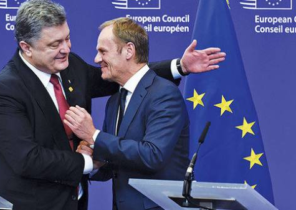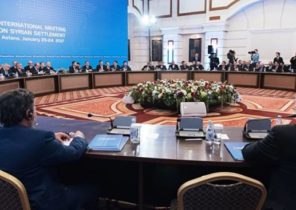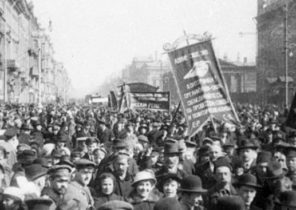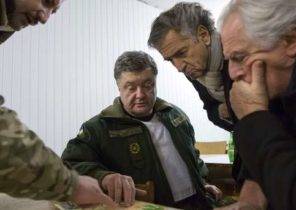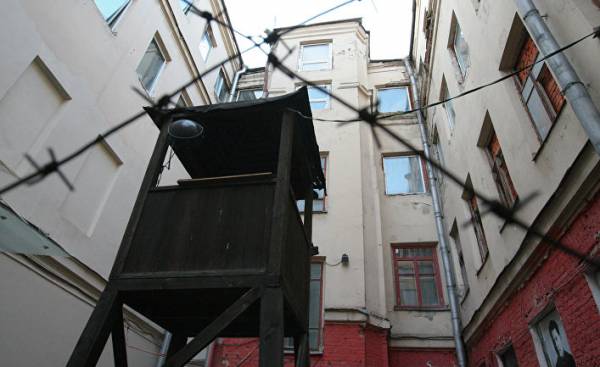
In the Baltic States the history of the Soviet time, has acquired a logical and correct move here was not only living national memory of repression, had a desire to bring under legal result, what can be said about Russia, according to well-known Russian historian, Deputy Chairman of the society “memorial” Nikita Petrov.
As for Russia, at the time, people are convinced that the repression was justified and necessary, but there were “excesses”. It is this concept of “bends” allows the government now to say that she is always right, and if wrong, then corrects these errors: “History plays an important role, because with its help they try to convince us that we — like the tsarist Empire and the Soviet Union, has always been right and all of our neighbors do only good, and they should be grateful to us. And they now criticize us, displeased with us, not telling us thank you. For the Imperial consciousness is a great insult, complex.”
Delfi: Lithuania subject reference means a lot, it always say that it is encouraged at the state level. Why in Russia we still are seeing the erection of new monuments to Stalin? After all, it is recognized that Russia, too, the order suffered.
Nikita Petrov: Russia of course, from the repression suffered by millions if to speak about direct victims. But there are relatives, but the subject touched. But unlike Lithuania, the population was much more intimidated in the Soviet years. Secondly, of course, the memory of repression is. There are people who collect the materials, make the publication is, incidentally, a quite distinct state. If we take the rehabilitation act, there is very clearly said about state terror. Similarly, in the decision of the constitutional court of 30 November 1992, said that power was based on violence, and carried out massive repression. But all these declarations, unfortunately, are not a factor of national memory.
Why?
— Somehow overpower Imperial ambitions and Imperial complexes. People convinced and persuaded in the Soviet time, that the repression was justified and necessary, but were excesses. And this concept of the “excesses” became the symbol, which allows the government to say that the government actually is always right, but sometimes she’s wrong, but corrects these errors. As, for example, in Khrushchev’s time. However, no one analyzes or thinks that these “corrections” were sometimes made too late, too vaguely, not until the end was to restore the rights of rehabilitated — they do not become those who are constantly about this would resemble.
— If you remember the second half of the eighties, when all avidly read materials about the persecution in the “spark”, etc. — is agitated the society was interested in it, but this interest slept…
— Yes, but let’s not forget about the other, even in the years of Gorbachev’s perestroika, when the anti-Stalinist pathos was at the height of this pathos was not anti-Soviet. We must not forget that the Communist party to end its activities secret, and the true figures of the extent of repression. Archival documents were released after August 1991. And no published orders, directives, decrees of the Politburo of the mass operations of 1937-38. Everyone knew that were deported peoples that under Khrushchev some people were able to return. In short, half-hearted actions of the Soviet government led to the figure.
Only after August 1991 the situation was clarified from the point of view of documentary and archival sources, but moral ardor to have a serious conversation about the past and to sum up is lost, because it started a different story — the economic difficulties, the issue of arranging the current of life was more important. And for the national memory would need to take the next step, and Yeltsin’s regime had the steps to do, but the course was set on harmony, a reconciliation, in order not to excite the public — all softened and never seriously broached the issue of lustration and punishment of the guilty, this left.
In the Baltic States the history has become quite logical and correct extension. Here not only was the living national memory of the repression, but there was a desire to bring the legal result. Accordingly, if here were found guilty in the persecution, he was pursued by the courts. No one demanded that the old man was put in jail, but guilty in the court is an indispensable requirement.
— If to speak about the current situation — how accessible are the archives?
— I can say that they have never been available, even under Yeltsin, because then the question was, what to do with them. There were people who were engaged in it, and I including, we presented the constitutional court, and the Commission of the Supreme Council for the receipt and transfer of Affairs of the CPSU and the KGB to state custody. If a party somehow figured out the system of state security remained intact. She reformed, transformed, but continued to keep their archives in no hurry to part with them. In this sense, the archives are not normal, civilized access.
— What is the reason that these archives are afraid to open, yet it took quite a long time of repression?
— I would just say that they (security services — approx. ed.) all the same, but it doesn’t explain. This is what is called a habit, a mentality, because when they keep their archives, of course, admit the possibility for the relatives to see the archival-investigatory cases. But it’s a matter on a specific person, and the great mysteries contain and could not, this is what the defendant himself knew, and I could know his family, and now it is granted to researchers after 75-year Statute of limitations restrictions on personal freedom. And that’s when questions arise. There’s still office work documentation, administrative documentation, which is regulated by repression. And then the staff start systems, they strongly inhibit access to what is called inner life of the security organs, how it was arranged, staff, agent-operational activity, etc. Here they see for themselves, that the tools do not want to reveal today.
— Following your logic, the structure of these bodies has not changed?
— They are all convinced that the forms and methods of activities they are all the same. It’s silly complex for the reason that in Soviet times was not approved by law what is called the rules of the agent-operational activities. Now there is a law about this and in principle the tools, this activity is understandable and given the rank of a Federal act, so to hide the last user of the NKVD, which, in principle, repeat the tricks used by all and always silly. Work with agents, maintenance of personal files of agents, safe houses — this is known to everyone, especially that part of such archives in the Baltic States, the Ukraine, known and open. It is complex.
— Closed archives leads to the fact that different numbers appear in the number of the repressed, different interpretations, in the absence of documentary material we have to look for other materials. All of this is affecting the fullness of the picture.
— You have indicated two problems at once. The first is the numbers. In the absence of figures that would be recognized by the state, society is to blame historians, because statistics are available in a wide variety of sources. It and accounting documents of the Central Committee, the Ministry of interior, the judiciary, operational and investigative activity of bodies of security available and published. But society and historians do not agree about who should be considered victims. Who is right and wrong repressed repressed.
If we take repression in 1937, we can see that by order 00447 “On the operation of repression of former kulaks, criminals and other anti-Soviet elements” are also criminals. And how it to consider? It turns out that he is an innocent victim because he was shot by a single external sign — it is the power of a felon. But society cannot agree on this occasion. Very long time, the KGB and Gorbachev in the last years, and in the early nineties refused to rehabilitate the so-called Skorokhodov. But at the time of arrest and execution, these people did not steal anything, they were shot because they once were such. It’s kind of brutal Stalinist purges of society. And historians need to agree not only about numbers but also about what Stalinist justice that isn’t justice and the system of political killings, violations of constitutional norms that existed in the USSR. This understanding is still there, so when we talk about numbers, then society is to blame, I’d say.
The second question is about the legal assessment of the Soviet past. If we consider this past as a criminal, it is easier for us to relate to documentary heritage.
— In the current environment in Russia is difficult to detect the anti-Soviet pathos of which you speak.
— I think, to deal with the Soviet repressive history is not required the anti-Soviet pathos. We need a sober assessment. What personally blame the government, Stalin? To call Stalin a criminal need? Necessary. There are reasons for this? Of course. Many historians said that if you look at the activities of Stalin, it is very specific crimes against the Soviet constitutional order.
Instead he put monuments…
Yeah, instead, we are witnessing not only attempts to justify it, but somehow emphasize his merits to say if not for him, then during the Second world war we would not have won.
— Why is the current government?
— The current government wants to rely on myth, legends regarding the greatness and righteousness of our country. It’s hard to live in the country, the seventy-year period which is called criminal, so I want to find an excuse, hence all these discussions: a) who should be considered victims, and b) maybe it was a mistake.
In General, the Soviet system need to assess not only from the point of view of pathos, and from the point of view of the law. If we look at the Soviet Constitution, we see that Stalin violated constitutional norms, the laws on the judicial system. All rights that were provided in this Constitution, Stalin simply violated for political and Imperial purposes. But today it is possible to agree and say that this is not the type of state conduct, which we can approve. We must condemn it. Then the next question: our government was criminal, wrong, but then you have to draw the line and do it at the level of legal recognition of the state. Why is the CC decision and the rehabilitation act, where in the preamble is the condemnation of the Soviet period, hanging in the air? Because they were not backed up by concrete measures, by the complete opening of the archives, deciding on the perpetrators, the inability of any propaganda of Stalin at any level. The only thing we have done in the Parliament of Ingushetia, a law was passed banning the glorification of Stalin on the territory of the Republic.
Evicted people remember, and the country does not want to remember. The whole country would respect the evicted people and say that there are other deported peoples and the darkness the victims, for example, collectivization, the Great terror, the war and postwar repressions, etc., In principle we have no main thing — understanding in the society.
— The question of why the memory of the people close your eyes, and unpleasant pages of history. For example, in Lithuania we are now witnessing the process of discussing crimes of the local population in the Holocaust. While Russia still does not use in their vocabulary the term “occupation”, “mass links” when it comes to events of those years.
— From the outset, Russia has gone from an honest conversation regarding 1940, and why all this was necessary. And Russian historians, unfortunately, most of them continue to justify all these measures, arguing that there were violations, but in General, the forest brothers — enemies. I.e. up to the Imperial point of view. Once the forest brothers fought against the government, so the repression against them is justified. But this is absurd. The national liberation movement, not to call it wrong just because you are a member of the Empire. You need to take the point of view of specific people and ask if he wanted Sovietization? In what conditions he wanted to live? Instead, he was given Soviet pseudogestational. But overall, as soon as they wanted to do something, as it was under Gorbachev, began a repressive line, the frenetic efforts of the centre to split the people and to prevent this.
— It is interesting that the attitude to history is a line that separates the two views of the same events, because they are based on different values. And this is the policy instrument, which is talking about the falsification of history. You don’t think that the historical narrative of the current Russian government can somehow be transformed?
A difficult question in the sense that it is primary. We went different directions, because different perceptions of our common history within the USSR. Or we use a different understanding of history in order not to bond but to be on the position of confrontation. I think, it’s still not a difference in understanding history, it is a secondary instrument. The primary tool is the desire, if we are talking about Lithuania, not be part of the Soviet Empire, and to be an independent state and to build its line of movement in accordance with European standards. This is the most and don’t like (Russia — DELFI). It turns out that Lithuania considers itself a free state, included in the blocks, which Russia do not really like.
Initially it was not so, NATO and Russia were ready to cooperate, but then in Russia traditionalist and Imperial power began to put the question of what the EU and NATO — a hostile education. Moreover, where does their deep hostility —because of inability and unwillingness of Russia to live by the standards of democratic, legal States. In this case, the underlining features of Russia, is talking about sovereign democracy, a special Russian way. This makes Russian historians disagree with the assessments that are on the West. After all, if you look at things soberly, the history — there is an established chain of events. You can give it different interpretations. And where are these attempts? If we talk about Lithuanian historians, they stem from the facts compliance with the law, morality, and the appropriateness of the life and development of the Lithuanian state. Russian historians, because for the most part, they are at the service of the state (we have a few freestyle), I find the opportunity to argue a particular interpretation of the facts. Even worse, when they come to the line of denial of the facts at all. In a sense, it turns out that the story was a tool, not a cause of separation. Russia can not prove the inconsistency from the point of view of the organization of life in a legal, democratic state.
— There is probably an element of resentment when talking about what you call your own civilization and you thus leaving.
Is in the first place.
Including now leave Russia itself or, as happened at the end of March, openly Express their disagreement in the conduct of the authorities.
— Secondly, if we talk about the youth protests that they have no clear political program. There is a protest, a rejection of the state lies sees young people, but there main motive is young has no future, no pathos, dynamics, positive dynamics. They feel that the country comes to a standstill. They feel that they live in politically and economically backward country, they see how to live in the West. Here it turns out that the state is at war, cheats, mocks its citizens. What a great goal for Russia exists today.
I understand how many people like Khrushchev’s “thaw”. There were ideas and ideals, because it has changed a lot in the country. Yes, people believed with a kind of fake — communism, the brotherhood of Nations, nevertheless, has not been canceled noble aspirations that have been in the sixties. Everyone thought that there is a positive trend, it seemed that today more than yesterday, there are new opportunities for the realization of the individual. The stagnation of Brezhnev’s all remember that curtailed all free that it was during the “thaw”. Gorbachev’s perestroika is the second wind once again the positive dynamics and goals much better than communism. It is clear that socialism with a human face does not happen, but that’s what was in the public drive. But today’s youth is going nowhere. Society is slipping into the evil and active confrontation, brainwashing, coercive measures in relation to the political and social events. All that they see and they do not like it, another thing is that they haven’t created a program. But know instinctively what they want the country to develop in a positive direction and are not pushed to the status of a rogue state. And the story of all these arguments plays an important role, because with its help they try to convince us that we — like the tsarist Empire and the Soviet Union, has always been right and all of our neighbors did nothing but good and they should be grateful to us. And they now criticize us, displeased with us, not telling us thank you. For Imperial consciousness — it is a great offense, the complex.
— Why the current political system stood up to the Soviet base. We see TV shows, movies, holidays, at the same time, books study, such as the book, Anne Applebaum on Gulag, is not represented on a large scale?
— If we go to the bookstore “Moscow” is a kind of showcase of the book market, the representativeness of the sample the following: there is a book Applebaum, the book of Oleg Khlevniuk about Stalin. This is a good book, telling the story. But several editions that we can call scientific, and politically calibrated and a good side by side with twenty titles of fake books about Stalin.
— Why the government has chosen its support of the twentieth century, we have entered into the next century. The appeal goes to the Soviet that in the current environment is not working.
— Let’s start with the fact that these books are often written by people who are firmly stuck in the Soviet period. And there are such people in any country, at least in Lithuania, at least in Russia. But in Lithuania, they do not really submit your work to a stale product that nobody will buy it. In Lithuania you can write a book praising the Soviet Lithuania, for example, memories of how fun he lived in snechkus growing, but who will buy? It will be a good source over man will chuckle. And then what is called “human memory” depends on foreign influence.
In Russia there is brainwashing on the subject of the Soviet era, which was the “Golden dream”, even Brezhnev era begin to praise, it has become mainstream. But against this background I am surprised. If you look at the movies, TV shows sort of aggressive Stalinism, spetssluzhbisty Paphos is often about the war. When removed about the everyday life under socialism — “the Thaw,” “Once in Rostov”, etc, you will see that it is quite sharp and critical approach towards the socialist system of existence.
In the end, the filmmakers are playing a complex game with one hand, trying to make the Soviet era the “Golden dream”, on the other hand, specific movies and facts just exposed her. And I watch these movies with great interest: will you play any of the young artists of the Soviet man. I see that they can not play, can’t fit in this skin, dynamics, motor skills, reaction to certain events. I see it’s invented characters. And suddenly I understand: the Soviet people died, it’s gone, it’s impossible to play even on the screen. It can be taken from old movies, there is a Soviet man.
There is, incidentally, very good films made in the Soviet era — “Stop the train”, for example, or “the Word for protection” about the Soviet everyday life. Such films are very difficult to watch. For example, “Holidays in September” a very difficult film. I’m not even talking about the time of perestroika. “Little Vera” has split the society. This movie is about real life, but nobody wants to admit that and lived that it was arranged perestroika reality. But when we say this, we are talking about the type of consciousness: does the current person to know, to see and appreciate this truth or it is more convenient to live with myths and fabrications?
— How would you answer this question?
— I am just like “Little Faith” rather than “Love and pigeons”, which is a fake and fiction. At the time it was strange that the film “Stop the train” Soviet power did not see all that is true, what was in it.
— Now in Russia the Soviet period is presented in the school curriculum?
— In the school curriculum to present the story as anything because it should be the main thing is to get the students to think for themselves. The goal is to give them food for thought. Now abandoned of the same text for all schools, agreed that there should be a single standard, as the texts may differ. And here is an attempt to put the textbook inconvenient facts, for example, the Katyn massacre. But there is always an attempt to justify. When textbooks write about this shooting, you write: “the response to the crimes of Stalinism.” Why the response? It is an independent, self-contained, heinous crime, it was not a response to anyone, and does. Just look at the documents, Beria’s note, where were the goals and objectives of this action. But they think that we are not that bad because other countries have also committed crimes. In short, if the whole scheme system to be reduced to a simple anecdote in Soviet times, Stalin’s crimes were just denied in the post-Soviet era came up with another scheme: Yes, we are bastards, but we’re not the worst of those reptiles that exist all around us.
— Nazi crimes were assessed, with the Holocaust are all clear. In the short term, You see the possibility of evaluating the crimes of the Soviet regime, and the need for constantly talking Lithuania and the Baltic States in General? What should be the conditions?
— If Russia will be on the path of development, democratic and legal state, would be fair to deny and denounce the criminal practices not only of the Soviet period, but also Putin’s Russia, then no problem, and a legal verdict, albeit belated, would be appropriate. A non-legal state that is based on “blood and soil”, “Russian world”, of course he was, not law and international obligations, and its false, in fact, nationalistic, imperialistic interests.
— Lithuania has to explain to the Europeans that communism was not white and fluffy. It is quite a difficult process.
— Of course, Lithuania is not easy in the EU for the reason that many EU countries simply do not have that experience. It can understand Germany, but it’s harder for the Danes and the Dutch. They have a long and prosperous tradition of legal norms and safeguards. And explain to them that in order to get out of the totalitarian past have to endure the verdict of those or other criminals, or even to restrict the forms of Communist propaganda — symbols ban, they should understand it. They just need all this patiently to explain. Just as in Germany banned Nazi symbols that reasonably and competently. In Lithuania the same. Nobody forbids on the market to sell items with Soviet symbols. Same thing with the Lithuanian school textbooks, there are lots of Soviet paraphernalia, but she needed it in order to show how it looked daily, the pioneer and Komsomol youth — Hitler absolute only in the Soviet sense. Bans symbols only to ensure that in any city once again failed to display red flag. Important not a ban, but a goal. And chosen line Lithuania to overcome the Soviet past, the Communist crimes, reasonable and sufficient. So, I think that to explain it to Europeans, Lithuania is not difficult.

